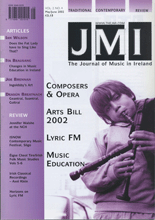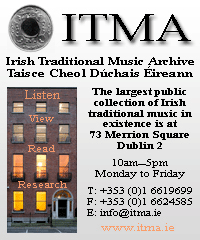Two recent events will certainly have major repercussions for Irish traditional music. The first is the Government’s backing of the Arts Council’s new five-year plan, a document which has serious intentions for the traditional arts. The second is the Minister for Arts, Heritage, Gaeltacht and the Islands’ presentation of a new Arts Bill which includes a proposal to establish a traditional arts ‘Standing Committee’ which ‘shall make recommendations to the Council in relation to the advance of moneys to any person relating to traditional Irish arts.’
The Arts Bill has not been enacted as law yet – it must go through various legislative stages first. But the fact that it has come to fruition with the traditional arts committee idea still in tact is quite extraordinary. Recently in the Irish Times (22 April 2002), an article by folk-song collector and former member of the Arts Council, Tom Munnelly, explained that he attended a meeting with the Arts Council in October 2000 to discuss this very idea,
Thirty people were asked to attend because of their involvement with traditional music to discuss the idea of a Traditional Arts Council. After a long discussion the idea was rejected unanimously. Repeat, unanimously! The Council was asked to convey the deliberations of the meeting to the Minister.
This advice has apparently been ignored, and in a recent radio interview the Minister, Síle de Valera, appeared confident that the Bill would pass though the legislative procedure successfully.
The Arts Bill proposes that the amount of people on the Arts Council should be reduced from seventeen to nine. In her speech to launch the Bill, the Minister explains that as a balance to this proposed reduction in the size of the Council membership, the Council will establish three standing committees, including one on traditional arts. (The other two relate to ‘matters relating to activities of local authorities in relation to the arts’ and ‘matters relating to artistic innovation’.)
Setting up a traditional arts committee to compensate for a reduction in Arts Council members suggests a very weak overall rationale indeed. If it is a case of making up numbers, why not create a committee for visual arts or drama or literature also? Why do the traditional arts get special treatment? That is the question being asked by many involved in traditional music. If the Arts Council felt it was necessary they could have mentioned the need for a separate committee in their Arts Plan. They haven’t. This brainwave comes from outside the Council.
The whole idea has a murky history. The creation of a ‘national State council for the development and promotion of the traditional arts such as native music, song, dance, storytelling, etc.’ was first proposed by Senator Labhrás Ó Murchú (Director General of Comhaltas Ceóltoirí Éireann) in the first ever Oireachtas Report on Traditional Irish Music, which he compiled for the Joint Oireachtas Committee on Heritage and the Irish Language in January 1999. In the Irish Times on 9th March 1999, the Report was described by reporter Mic Moroney as follows:
By any standards, this report is an extraordinary partisan document, which shows scant signs of research. Instead, it gives a romanticised and rather out-dated picture, which concentrates on the virtues of only one organisation: Comhaltas Ceoltóirí Éireann.
What followed was an angry stream of correspondence in the letters page between Labhrás Ó Murchú and his supporters and various critics of the Report – Tom Munnelly, John Moulden, Terry Moylan, Nicholas Carolan, Fintan Vallely and Matt Cranitch. The letters continued to appear up until late May.
Following this debacle, the Report appeared to be shelved, and when one considers the meeting in October 2000 attended by Munnelly and others, one would imagine that the idea of a separate traditional arts committee/council was dead in the water. But now its creation appears to be imminent.
This standing committee shall consist of a chairperson, who must be a member of the Arts Council, and who is appointed by the Minister, as well as 4 ordinary members, of whom:
•2 shall be appointed by the Minister, and
•2 shall be appointed by the Council.
Of the present nineteen members of the Arts Council – one of which will chair the traditional arts committee – the only one with any obvious experience in traditional music is Úna Ó Murchú, artistic director of Brú Ború, the flagship theatre and performing arts group of Comhaltas Ceoltóirí Éireann.
Some traditional musicians may be quite flattered by the setting up of a traditional arts committee, believing it is proof of how seriously traditional art forms are now taken by the Government. But there is no evidence to suggest that that is the rationale behind it either.
It is unlikely that any member of Dáil Éireann will try to seriously obstruct the Bill, and therefore the only realistic strategy for those involved in traditional music who are sceptical about the move is simply to wait and see what happens. But in reality, the traditional music community should not have been put in this position. A representative number objected to the idea and they weren’t listened to.
The irony of all this is that the idea for this committee was fuelled by the belief that traditional music hasn’t been properly represented so far, but in the crusade to rectify this supposed problem, the views of those within traditional music have actually been trampled on!
JMI would welcome readers’ thoughts and views on these developments.
Both the Arts Bill 2002 and the Arts Plan 2002-2006 can be downloaded from the Arts Council’s web-site: www.artscouncil.ie
The Minister’s speech concerning the launch of the Bill can be found on the Department’s web-site: www.ealga.ie
Tom Munnelly’s article can be found on the Irish Times website: www.ireland.com
Toner Quinn is a traditional fiddle-player and editor of JMI.



